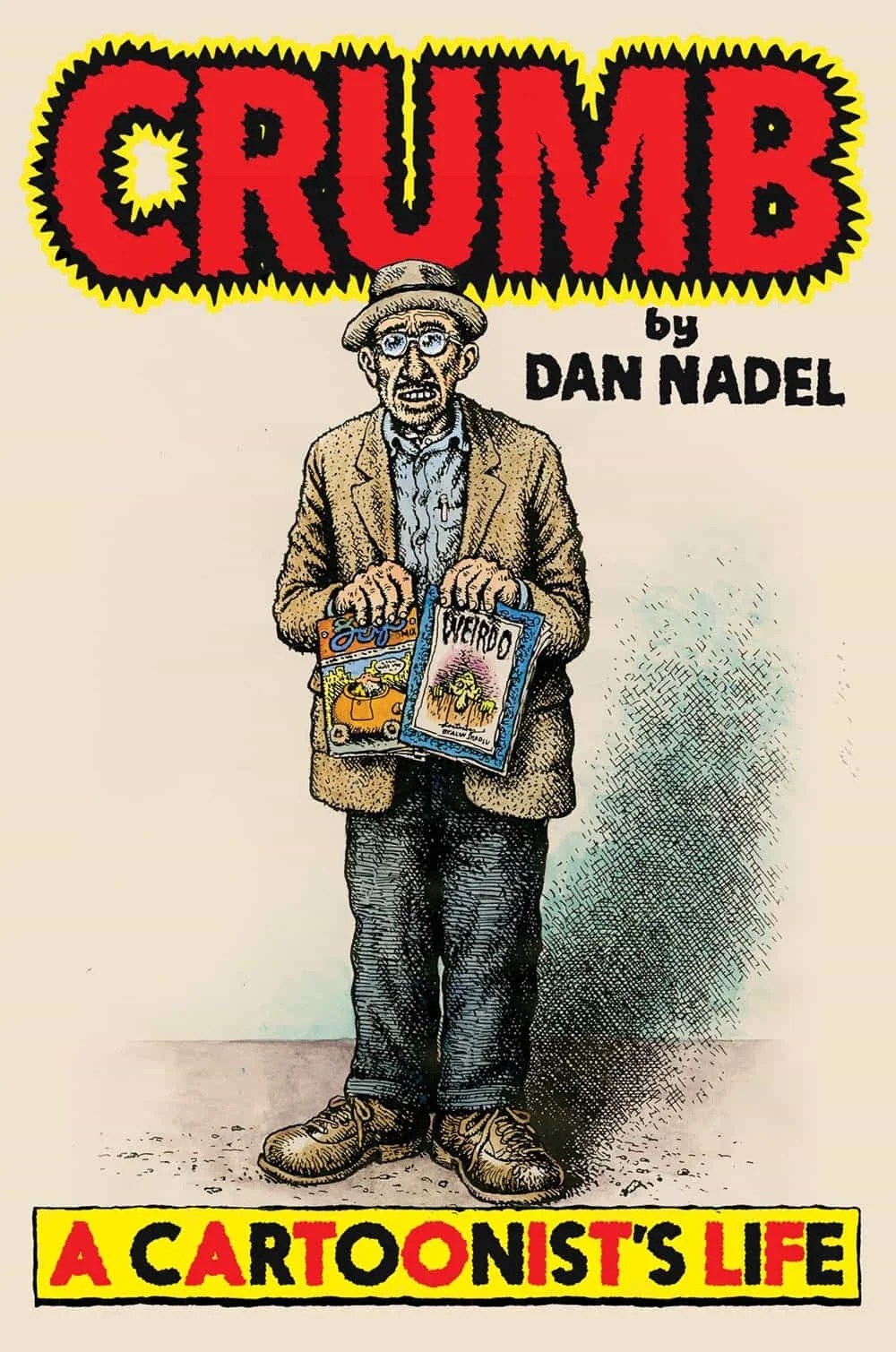
The first biography of Robert Crumb—one of the most profound and influential artists of the 20th century—whose iconic, radically frank and meticulously rendered cartoons and comics inspired generations of readers and cartoonists, from Art Spiegelman to Alison Bechdel.
It’s somewhat surprising that Crumb: A Cartoonist’s Life is the first full-length biography of the artist, given the significant exposure he received through Terry Zwigoff’s acclaimed 1994 documentary Crumb. Yet, Dan Nadel’s biography fills this long-standing gap with remarkable insight and depth. He charts Crumb’s journey from a troubled childhood through his rise in the countercultural comics scene of the 1960s and beyond, culminating in his retreat to rural France with his late wife and fellow cartoonist, Aline Kominsky-Crumb.
Robert Crumb is far from your typical comic book artist. A deeply complex and often contradictory figure, Crumb himself could easily be mistaken for a character from one of his provocative underground comics. In many ways, he pioneered the practice of inserting his image and psyche into his work, offering readers an unfiltered glimpse into his inner world—one that is as unsettling as it is fascinating.
What I’ve always loved—what grabs me—about Robert Crumb’s work is that unmistakable, scratchy, obsessive linework. It’s not just drawn—it’s carved onto the page, etched with such intense cross-hatching that it feels like his very soul is embedded in the shadows. Every panel pulses with grit and nervous energy. His style is so distinctive, so unapologetically Crumb, that you can spot it a mile away.

In Crumb: A Cartoonist’s Life, Nadel explores how Crumb’s early work—infused with the hallucinatory influence of LSD—gave birth to grotesque, satirical figures like Fritz the Cat and Mr. Natural, characters that simultaneously entertained and shocked with their unfiltered commentary on society. Crumb’s unapologetically raw and often controversial style pushed the boundaries of taste and political correctness, frequently earning him both condemnation and admiration. Accusations of misogyny and racism have long followed his work, yet these same comics often lay bare Crumb’s neuroses, compulsions, and social anxieties, blurring the line between autobiography and satire.
As a kid, those “Keep on Truckin’” guys—those absurdly stretched-out left legs marching defiantly forward—burned into my brain. And then there’s that bespectacled weirdo in the cardigan and fedora, forever anxious, hunched like a question mark—Crumb is that character. He is the comic strip. No fantasy too weird, no kink too twisted, no thought too raw—he put it all out there, daring you to look away.
Crumb: A Cartoonist’s Life has been widely praised for its candid and layered portrayal of one of America’s most enigmatic and influential artists. More than just a biography, it is a compelling study of an artist who has consistently defied expectations, challenged societal norms, and carved out a legacy entirely on his terms. The book serves as an essential companion to the documentary, offering a more expansive and nuanced perspective on the man behind the pen—an artist who continues to provoke, inspire, and confound audiences to this day.
Crumb cracked comics wide open. Without Crumb, there’d be no indie comics as we know them. No Daniel Clowes, no Alison Bechdel, no Chester Brown, no Harvey Pekar, no Ivan Brunetti—he didn’t just inspire them, he unleashed them.
Dan Nadel’s Crumb: A Cartoonist’s Life doesn’t just revisit the icon’s early years—it dives headfirst into the three decades that followed the 1994 documentary, a chapter of Crumb’s life that’s rarely explored. There’s so much life here. So much depth, contradiction, and beauty. This biography doesn’t just tell Crumb’s story—it honors it. Justice is done.

Robert Crumb is often credited with single-handedly transforming the comics medium into a place for adult expression, in the process pioneering the underground comic book industry, and transforming the vernacular language of 20th-century America into an instantly recognizable and popular aesthetic, as iconic as Walt Disney or Charles Schulz. Now, for the first time, Dan Nadel, a curator and writer specializing in comics and art, shares how this complicated artist survived childhood abuse, fame in his twenties, more fame, and came out the other side intact.
More than just a biography of an iconic cartoonist, Crumb is the story of a richly complex life at the forefront of both the underground and popular cultures of post-war America. Including forty-five stunning black-and-white images throughout and a sixteen-page color insert featuring images both iconic and obscure, Crumb spans the pressures of 1950s suburban America and Crumb’s highly dysfunctional early family life; the history of comics and graphic satire; 20th-century popular music; the world of the counterculture; the birth of underground comic books in 1960s San Francisco with Crumb’s Zap Comix; the economic challenges and dissolution of the hippie dream; and the path Robert Crumb blazed through it all.
Written with Crumb’s cooperation, this fascinating, rollicking book takes in seven decades of Crumb’s iconic works, including Fritz the Cat, Weirdo, and his final book-length comic of The Book of Genesis; capturing, in the process, the essence of an extraordinary artist and his times.
Dan Nadel is a writer and curator. His previous books include, It’s Life as a I See It: Black Cartoonists in Chicago, 1940–1980; Peter Saul: Professional Artist Correspondence, 1945–1976; and Art Out of Time: Unknown Comic Visionaries, 1900–1969. Nadel has curated exhibitions for galleries and museums internationally including the Museum of Contemporary Art Chicago, the Manetti Shrem Museum of Art, UC Davis, and the Whitney Museum of American Art. He is the founder of PictureBox, a publishing and packaging company that produced over one hundred books, objects, and zines from 2000 to 2014, including the Grammy Award-winning design for Wilco’s 2004 album A Ghost Is Born. Dan is the curator-at-large for the Lucas Museum of Narrative Art. He lives in Brooklyn, New York, with his family.
Discover more from Sandbox World
Subscribe to get the latest posts sent to your email.